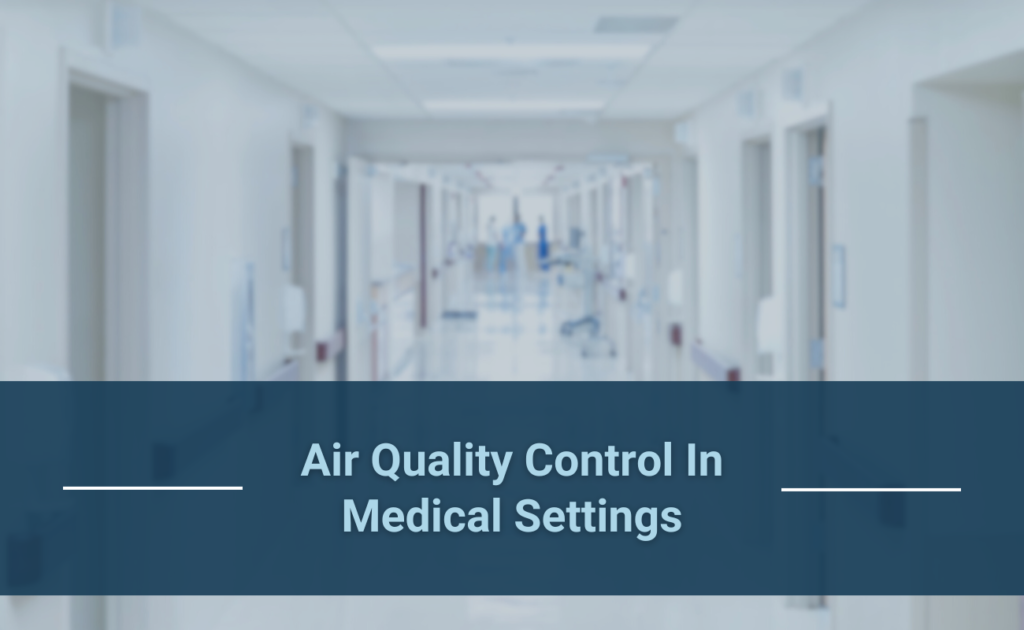Proper air quality is vital for ensuring the safety and well-being of patients in hospitals. Maintaining appropriate air quality is crucial to preventing infections, enhancing patient outcomes, and safeguarding staff, as vulnerable patients and healthcare workers are continuously exposed to airborne contaminants. Our experience with air quality testing for hospitals has allowed us to understand the need for control over air pollutants. Hospitals have to follow strict rules about air quality, and regular testing and maintenance are necessary to make sure that everyone is safe.
Why Is Air Quality So Important In Medical Settings?
Medical environments house vulnerable individuals, such as immunocompromised patients and healthcare workers, who are exposed to various airborne pathogens. Maintaining clean, well-filtered air directly impacts infection control, patient recovery, and the overall safety of everyone in the building.
- Infection Control & Patient Safety: Airborne transmission is a primary concern in healthcare settings. Poorly maintained ventilation systems can spread pathogens, infecting patients, visitors, and staff.
- Improving Patient Outcomes: Good air quality enhances patient comfort and recovery. Proper ventilation reduces airborne irritants and contaminants, which can worsen respiratory conditions or delay healing.
- Workplace Safety For Hospital Staff: Healthcare professionals face consistent exposure to airborne chemicals, biological contaminants, and other pollutants. Clean air ensures staff safety, reducing the risk of long-term health issues like respiratory problems or allergic reactions.
Guidelines & Industry Standards For Air Quality In Hospitals
For the safety of patients, staff, and visitors, there are standards and guidelines in place to ensure optimal air quality in hospitals and healthcare settings:
- ASHRAE Standard 170: This standard outlines ventilation requirements for healthcare facilities, specifying air exchange rates and filtration systems necessary to reduce airborne contaminants in critical areas like patient wards and operating rooms.
- CDC Guidelines: The CDC provides infection control guidelines focused on controlling airborne pathogens through ventilation, air filtration, and humidity management.
- The Joint Commission: The Joint Commission accredits healthcare facilities by ensuring compliance with air quality standards through regular audits, filter maintenance, and adherence to ventilation system requirements.
Testing & Controlling Air Quality In Healthcare Settings
To meet these industry standards, hospitals rely on several strategies and technologies to effectively manage air quality:
- Ventilation Systems: HVAC systems play a critical role in controlling airborne contaminants. Proper airflow and air exchanges in spaces like isolation units and operating rooms are essential for maintaining a safe environment.
- HEPA Filters: High-Efficiency Particulate Air (HEPA) filters capture harmful particles like bacteria and viruses, acting as a vital barrier in high-risk areas.
- UVGI (Ultraviolet Germicidal Irradiation): Some hospitals use UVGI within HVAC systems to kill airborne pathogens, offering additional protection beyond filtration.
- Humidity and Temperature Control: Keeping humidity between 30 and 60% helps prevent mold growth while ensuring patient comfort and safety.
- Air Quality Monitoring: Routine monitoring using particle counters and humidity sensors ensures that air quality remains consistent, quickly detecting changes that could pose health risks to patients and staff.
Typical Air Quality Maintenance Schedule For Healthcare Facilities
A regular maintenance schedule helps ensure that air handling units and filtration systems perform optimally, preventing the spread of airborne contaminants. A typical maintenance schedule might look like this:
- Daily Checks: Inspect air handling systems daily to ensure proper airflow, temperature, and humidity levels.
- Monthly Maintenance: Replace air filters, particularly in high-risk areas like isolation rooms and operation theaters, to maintain optimal air quality.
- Annual Deep Cleaning: Schedule annual audits and deep cleanings of HVAC systems to remove dust and contaminants, ensuring peak performance and compliance with health standards.
Contact PROAC To Ensure Clean Air In Your Healthcare Facility
Ensure your facility’s air quality meets the highest standards. Contact PROAC today to schedule your hospital’s air quality testing and create a healthier, safer environment with our professional air quality control solutions tailored to your needs. Perform professional air quality testing in your facilities to make sure the air you are breathing is healthy. We have performed a variety of commercial air quality tests in Philadelphia, as well as air quality testing for schools, healthcare facilities, and more. Learn more about PROAC and how we can serve you.

